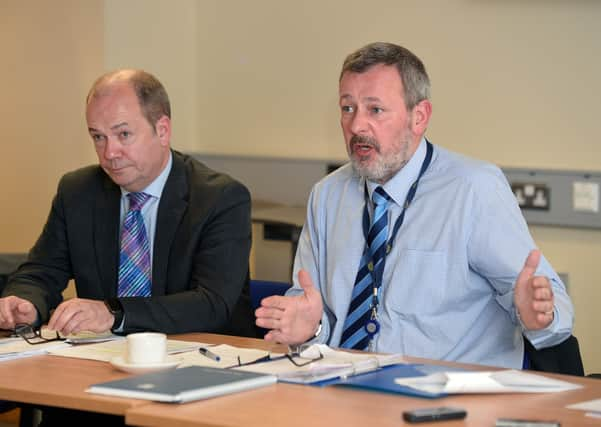Coronavirus: Visitors will be allowed just hour to see dying relatives and must come alone, as health bosses clamp down


The Department of Health said the civil servant heading the department, Richard Pengelly, has written to all five health trusts across the Province to set out what the next steps are.
They include sharply restricting the abilities of parents to be with sick children, and capping the time people can spend with a dying relative.
Advertisement
Hide AdAdvertisement
Hide AdThe letter says that with “immediate effect, all visits to general hospitals has now stopped”.
There are a handful of exceptions, set out as follows:
l Palliative (end of life) care: One visitor permitted to visit; the duration and timing of the visit must be agreed in advance with the ward sister or charge nurse – normally a maximum of one hour. It also recommends the policy for nursing homes and hospices too;
l Maternity: a woman in labour can be accompanied by one “birthing partner”, but there are no visitors permitted in ante-natal or post-natal ward areas;
l Paediatrics: Any children admitted can be accompanied by one parent or carer at a time;
Advertisement
Hide AdAdvertisement
Hide Adl Neonatology and paediatric intensive care: A patient in the neonatal ward/paediatric intensive care may be accompanied by one parent-visit, with duration to be agreed with the ward sister or charge nurse;
l Critical care (including adult intensive care, coronary care, high dependency units): One visitor permitted to visit. The duration and timing of the visit must be agreed in advance with the ward sister or charge nurse – normally a maximum of one hour.
Mr Pengelly said all these changes are part of the “next phase of emergency health service planning for the Covid-19 surge”.
The Chief Medical Officer for Northern Ireland Dr Michael McBride has repeatedly warned that one of the greatest dangers of the crisis is that the pandemic spikes all at once, overwhelming hospitals and in turn causing people with illnesses other than coronavirus to die.
Advertisement
Hide AdAdvertisement
Hide AdMr Pengelly also said trusts should urgently discharge all patients who are well enough, and suggested that “clinicians should begin to categorise patients into priority groups”.
He added: “The lowest prioritisation would be where treatment can be delayed for two to three months with no predicted negative outcome. Urgent and emergency treatments should continue to be given top priority.”
The letter also acknowledges: “Even if the social distancing measures have the impact we hope, our modelling still indicates that we will require more critical care capacity than is currently available.”